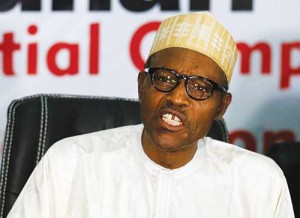The order finally came to the military on Thursday, August 13 to end the destruction of lives and property by Boko Haram sect and restore peace, law and order nationwide.
President Muhammadu Buhari chose the occasion of the decoration of the new service chiefs to order them into war in collaboration with the police, vigilantes and other security agencies.
“You are all aware of the various security challenges facing our nation. These challenges include the activities of Boko Haram terrorists, armed banditry, kidnapping and militancy of various forms, to mention a few.
“The activities of these misguided groups and individuals have resulted in wanton destruction of life and property of our citizens and a disruption of the socio-economic life of millions of Nigerians,” Buhari said.
Carrying out the order will not be a piece of cake.
Chief of Defence Staff, General Abayomi Olonisakin; Chief of Army Staff, Lt. Gen. Tukur Buratai; Chief of Naval Staff, Vice Marshal Ibok-Ete Ibas; and Chief of Air Staff, Air Marshal Sadique Abubakar; face an uphill task.
They need to harness the support and cooperation of all and sundry to succeed. For instance, Boko Haram insurgents no longer move in large convoys of Hilux and motorcycles to murder, pillage and raze whole towns and villages.
Ditto when they attack military and police formations.
Their resort to recruiting disguised suicide bombers to detonate bombs and kill compatriots implies mobile warfronts which require intensive intelligence in community policing methods to ferret and confront them.
Hardening security and intelligence networks of state governments outside the North East is necessary.
Olonishakin thanked Buhari for calling them to serve their fatherland and assured that he and the other service chiefs would justify the confidence reposed in them to march on violent, murderous gangs and insurgents.
We caution, however, that former Goodluck Jonathan gave similar orders for the Armed Forces to crush the insurgents.
Reports from the frontlines, echoed in retrospect by some service chiefs at their recent handover events to the incumbents, admitted that troops went into battle unprepared, ill-equipped and unmotivated.
The consequence was the large number of desertions, mutiny and escape from the frontlines. Hence our demand that soldiers on trial at court martials or on death row with pleas of poor equipment and welfare must be freed.
Why the top hierarchy of the Armed Forces did not address these complaints before the deserters were ordered into action unprepared remains preposterous.
“While commending the efforts of the Armed Forces so far, you need to brace up and continue to team up with other stakeholders to come up with a well-coordinated joint effort which will bring a desired end to this insurgency within three months,” Buhari told the service chiefs.
From the G7 Summit in Germany, to cooperation meetings of the Lake Chad Basin Commission states of Chad, Cameroon, Niger and Benin republics, Buhari has mobilised effort to ensure that the insurgents do not hop across borders into safe havens in neighbouring countries after attacks.
The Multinational Joint Task Force set up by the Africa Union will also minimise cross border attacks. Again, Nigeria’s rapprochement with the United States will reopen supply lines of weapons and equipment.
How fast the Defence Industries Corporation of Nigeria (DICON) in Kaduna would be resuscitated to manufacture at least light assault weapons and bullets, including those designed by National Agency for Science and Engineering Infrastructure (NASENI), for instance, remains a moot point.
The Air Force has deployed new equipment to the North East, the epicentre of the insurgency, after Abubakar’s recent visit.
They include F-7Ni fighter aircraft, Mi-24/35 attack helicopters, Agusta 109 LUH, Supa Puma Combat Support helicopter and ATR-42 surveillance aircraft.
The Army acquired new game-changer equipment such as Alpha jets, armoured personnel carriers, mine-resistant ambush protected (MRAP) vehicles, advanced artillery, arms and ammunition, surveillance drones, T72 multi-purpose tanks and re-modified F7 supersonic jet fighters.
All these helped the well-armed troops who have body armour for protection against attacks from shrapnel and small arms fire to route Boko Haram from 22 local governments it once named its Caliphate.
Still, the six-year insurgency has left at least 17,000 dead, mostly civilians; and one million driven out of their homes into camps in inhospitable conditions. Experts speculate that dejected camp dwellers are soft targets for recruitment of suicide bombers.
The service chiefs are confronted with the training, equipping, morale and welfare of the troops who lay down their lives to defend and secure the country. Buhari said their sterling leadership recommended them for elevation.
But he warned that they must be accountable for all men, equipment and other resources under their command and ensure troops’ welfare. So also must they protect civilians and unarmed combatants in war zones as demanded by the international rules of engagement.
Buhari promised that the government will provide all the resources needed to achieve success.
The service chiefs have to restore professional pride to the Armed Forces whose exploits in international peace-keeping roles earned them the respect and admiration of all nations around the world.
They have three months to rout the terrorists and restore law and order to the areas they once occupied with draconian Sharia law imposed on residents.














